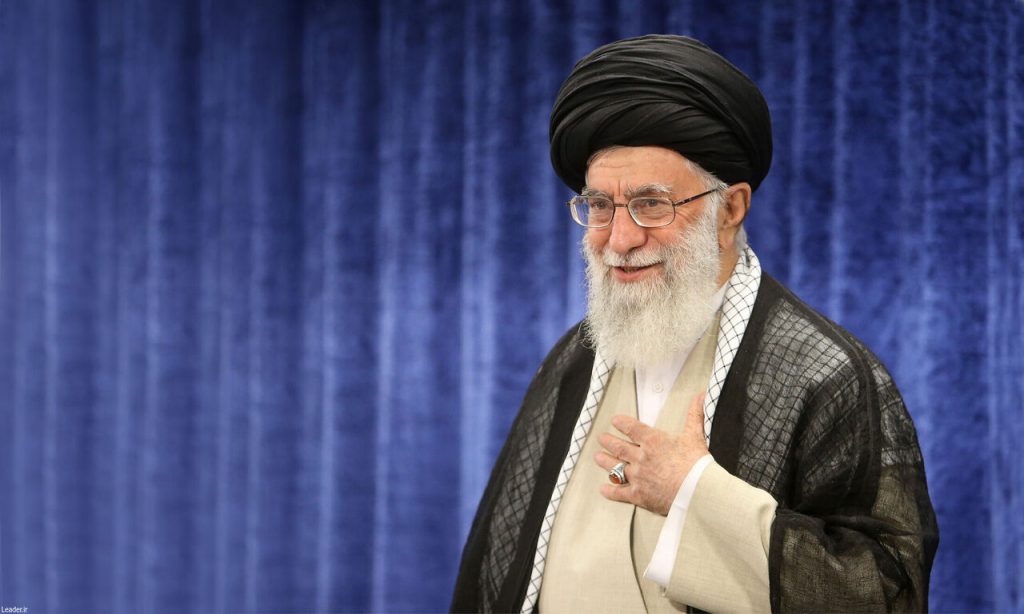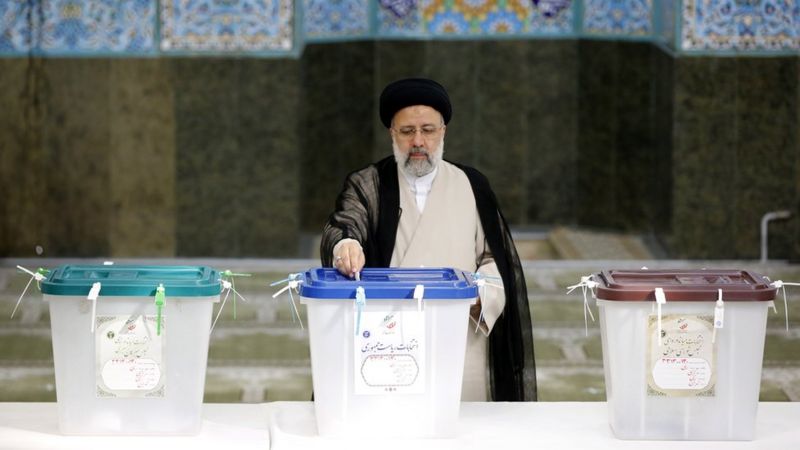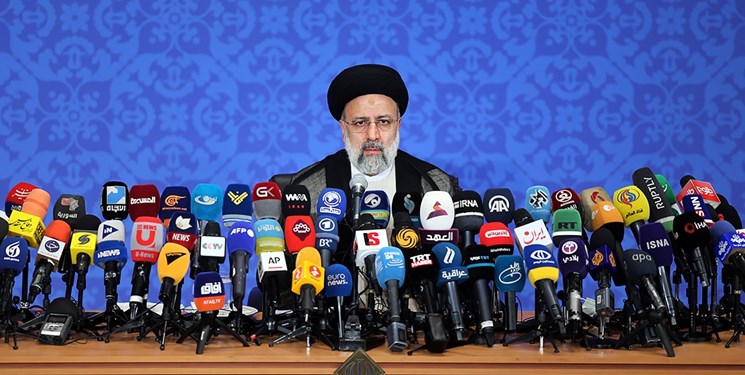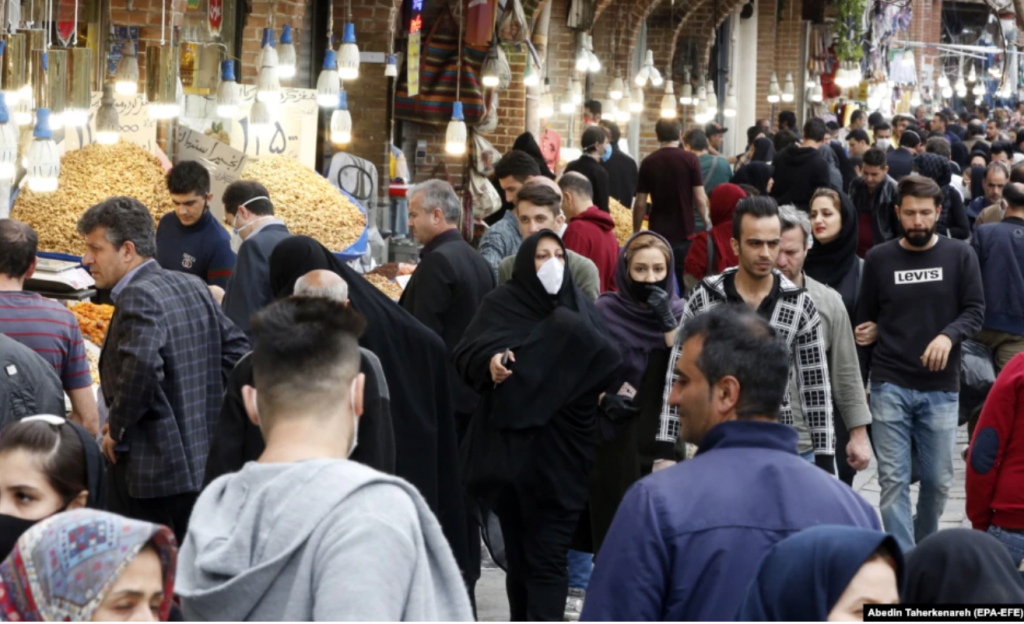
Raisi’s Message in His First Press Conference
The editorial of Ebtekar states that Ebrahim Raisi’s first press conference carried the clear message that he is a full-fledged “principlist” but wants to act moderately.
Ebrahim Raisi’s first press conference as president-elect had a clear message: he is a “principlist” but not a radical one. All his responses to the journalists’ questions were meant to convey to the audience and observers that unlike what is generally thought, the image of the head of the 13th government will be different from what has been predicted.
Those who coordinated Raisi’s first press conference had carefully set a time limit for it and Raisi himself was careful enough to avoid giving long-winded answers to the questions – which is the usual style of the country’s politicians and officials. This was significant because this was an opportunity for the president-elect to respond to some concerns of the public about him and his government’s approach. Moreover, the public had a chance to see if Raisi’s approach about the main issues is divergent from that of radical groups in the country.
As the press conference was short and Raisi avoided clarifying his government’s policies, he didn’t answer many questions that would outline the future of the executive branch. It seems that the coordinators of the press conference were only after conveying this message that Raisi is a realistic, moderate politician and his government will be one of moderation and will also be realistic in its agenda.
Raisi underlined solving the problems regarding livelihood, housing, inflation, unemployment, fixing relations with Arab neighbors in the Gulf, while he tried to downplay the role of foreign policy and sanctions in this regard.
This was one of the main concerns about the plans and programs of the presidential candidates: is the next government going to plan as if the sanctions will continue, or will it try to find a way out of the current situation? What is the role of the JCPOA in resolving the current issues facing the country? To what extent can de-escalating tensions with neighboring countries play a role in the JCPOA’s success? Will resolving the economic issues result in short-term economic growth, or will it impact long-term economic growth as well?
Important Questions For the President-elect
The editorial of Ebtekar raises important questions about appointing the new ministers as well as the country’s foreign policy that president-elect Ebrahim Raisi must answer.
The 13th presidential election in Iran is over and Raisi has been elected as the next president in an election with the lowest turnout in the history of Iran.
One of the most challenging issues of the 13th presidential election was the candidates’ debates. According to analysts, the debates were full of hollow slogans rather than clear plans. These debates largely failed to allay people’s economic concerns. Some of the questions which are significant for Iran’s future and which the president-elect must answer are:
Who will be appointed as ministers of significant ministries in the country? “Hardline principlist” governments have always been more interested in ideology than expertise. To them, the country must be run by the so-called “revolutionary” people.
Perhaps, this is the most concerning issue, as some of the names suggested for significant ministries in Raisi’s government are horrifying. It is impossible to have an economic minister who believes only in relying on domestic production and not cooperating with big countries in the world and then improve people’s poor economic conditions. Raisi hasn’t been clear in this regard, but hopefully he will appoint moderate, experienced experts for running the main ministries as the decisions of a prejudiced minister will have irreparable consequences for the country.
The other important question is Ebrahim Raisi’s views on interaction with the world. What will happen to the FATF? No economy in the world can be successful while restricting relations with global superpowers and not accepting international rules and regulations. What does Raisi think about returning to the JCPOA? Is Iran going to only interact with China and Russia? The main question for Raisi is: how can he bring about economic change while the country is afflicted by inflation, weak foreign diplomacy, limited relations with certain countries, and exclusion from the FATF?
Foreign Policy Doesn’t Change Overnight!
The editorial of Arman Melli underlines the fact that as Iranian foreign policy is not fully controlled by the government, it will not see any sea changes with the 13th government taking office.
Before the 2021 presidential election, the issue of Iran’s foreign policy was raised by one of the top-ranking officials of the country, and it was underscored that the government is not fully in charge of the country’s foreign policy. The objectives and measures regarding Iran’s foreign policy are dictated to the diplomatic apparatus of the country.
As a result, the 13th government will not determine Iran’s strategic foreign policy over the next four years. Accordingly, Iran’s foreign policy will not change overnight, while some minor changes in tactics might be seen here and there.
Today, the country is under sanctions which have created many problems for it. The country’s foreign policy must be determined in accordance with these sanctions. Therefore, as this government takes power, what is said about the threats facing the JCPOA is not true.
What must also be considered is that today a government close to “hardline principlists” is going to take office; such governments usually appoint ministers whose views are in line with the president and the supreme leader.
This coordination can have two positive consequences. First, the new government may adopt a more reasonable policy, which can increase the chance of more trade and commerce for the country. This might even result in Iran getting closer to the West and expediting the lifting of sanctions.
Second, the 13th government might have a radical agenda and say that if all sanctions are not lifted, Iran will not negotiate or implement its nuclear obligations. As such, Iran’s foreign policy will become clear, and its outcomes will be clearly witnessed. Perhaps, the Western parties to the nuclear deal might reach the conclusion that they have to give more concessions to Iran.
Today, Western countries do not want to exacerbate tensions, which is why we might see better results in Iran’s foreign policy in the coming months.
Fortunate Managers, Unfortunate People
The editorial of Samt ponders on the recent presidential election and how the candidates call Iranian people unfortunate and still do nothing about it.
Presidential debates in recent years, particularly the ones held in the past weeks, provided an opportunity to see how some of the senior managers and officials in the country view the people. These senior officials who were supposed to be defenders of the people looked at the camera and called the Iranian people unfortunate. And when they said they pity the people and will try to bring some bread to people’s tables and give them more cash subsidies, people did feel unfortunate from the bottom of their hearts.
If people were not unfortunate, the managers and officials who have been fortunate and have done nothing for the people and the country wouldn’t dare to directly call people unfortunate. If people weren’t unfortunate, they wouldn’t have to sit and watch the candidates – qualified by the Guardian Council – talk about corruption, rent-seeking, and the grim truth regarding the current reality.
If people weren’t unfortunate, they wouldn’t have to sit and watch those who acted as if they have just come to Iran from the most advanced countries. If people weren’t unfortunate, they would at least ask these candidates who have been ministers, lawmakers, judges, governors, and among top-ranking officials in the country for a long time: how come they have known about rent-seeking, corruption, lies and deception and have remained silent about it?
If people weren’t unfortunate, they would become curious to know which of these words are true or false, having heard these words from top-ranking Iranian officials. If people weren’t unfortunate, they wouldn’t vote for someone who would gain a lifetime position and would call people miserable.
Iranian people are unfortunate, and the officials are fortunate. The fortunate managers have never had to stand in line for bread, cheese, milk, chicken, sugar, etc. These fortunate managers have never seen advertisements for selling body organs all over the city. They have never heard of the hundreds of thousands of educated youths who are looking for jobs.

Judiciary Chief Ebrahim Raisi Becomes Iran’s New President Amid Popular Boycott of Elections

Iran’s Interior Ministry announced that Ebrahim Raisi has gained more than 17 million votes out of 28.6 million in the country’s 13th presidential election. More than 59 million people were eligible to vote; however, only 48.8 percent of people went to the polls in the lowest presidential election turnout in the past 42 years in Iran.
The number of spoiled ballots – which is 3.7 million – exceeds the number of votes given to other candidates: Mohsen Rezaei, Abdolnasser Hemmati and Amir Hossein Ghazizadeh-Hashemi. Rezaei gained 2.4 million votes, Hemmati, 2.4 million and Ghazizadeh Hashemi 999,000.
Ebrahim Raisi is currently the president-elect and judiciary chief at the same time which is unprecedented in the history of Iran establishment.
Known as “Ayatollah Massacre,” Raisi was a member of the Death Committee that issued execution sentences for thousands of prisoners in 1988. Ayatollah Hossein Ali Montazeri, deputy leader at the time, called these executions the “biggest crime committed by the Islamic Republic.”
Meanwhile, President Rouhani praised President-elect Raisi for “being fully informed of the country’s conditions, including its ups and downs and today’s issues such as coronavirus and sanctions.”
Foreign Minister Mohammad Javad Zarif called Raisi a “prudent politician” and “capable of running the country well.” Parliament Speaker Mohammad Bagher Ghalibaf also lauded Raisi’s “brilliant and justice-oriented records” while expressing his willingness to cooperate with him.
Iran Supreme Leader Ali Khamenei thanked the “loyal nation” for their participation in the election, saying neither dire economic conditions nor the pandemic could dissuade people from going to the polls.
Iran’s 13th presidential election was boycotted by a wide range of political and civil activists, families of those who were killed during the protests or executed by the Iranian government.
Iran’s 13th Presidential Election: Lowest Turnout Since the 1979 Revolution

76 percent of Tehran residents sat out of Iran’s 13th presidential election, according to official statistics. Tehran Election Headquarters announced that 26 percent of people in this city went to the polls; namely, only one out of four residents eligible to vote took part in the elections. Tehran, therefore, had the lowest turnout among other Iranian cities. In 2017, however, 67 percent of Tehran residents had voted in the presidential election.
The presidential election was held with the lowest level of participation this year in a situation where even the number of spoiled ballots exceeded the votes of the candidates competing with the election winner.
Altogether, more than 400,000 spoiled votes were counted in Tehran — which constitutes 12 percent of the total votes. In all Iranian provinces, the number of spoiled ballots was more than the votes given to Mohsen Rezaei, Abdolnasser Hemmati and Amir Hossein Ghazizadeh.
This poor attendance was witnessed despite the fact that Supreme Leader Ali Khamenei had said “if a blank vote leads to the weakening of the Islamic system, it is haram.” Moreover, Khamenei’s representative in the city of Mashhad, Ahmad Alamolhoda, who is also the father-in-law of Ebrahim Raisi, had declared the election boycotters as apostates.
To Iran establishment, a high number of votes signifies its own popularity among people. On the verge of the recent elections, Khamenei urged people to go to the polls, saying: “People not participating in the elections means they have become distant from the Islamic regime.”
According to the Interior Ministry, 48.8 percent of Iranians have taken part in the 13th presidential election. However, elections in Iran are not transparent as no independent institution in this country is allowed to review either the participation level or the way elections are held.
Raisi on His Role in Mass Executions of Political Prisoners: I Should Be Praised

President-elect Ebrahim Raisi in his first press conference answered questions about his human rights record as well as other issues such as his administration’s foreign policy.
When asked about his role in the mass executions of political prisoners in 1988, Raisi said: “If a prosecutor defends the rights of people and society’s security, he should be praised and encouraged.” He added: “I am very proud to have defended security and peace as a prosecutor wherever I was.”
Ebrahim Raisi has been one of the major figures of Iran’s judiciary for decades. Being a member of the Death Committee that issued execution sentences for thousands of prisoners played a key role in his promotions.
“Those who are currently violating human rights in the world, it is they who should be held accountable,” noted Raisi in his press conference.
Ebrahim Raisi also remarked that his administration will not just promote one special faction or political trend. However, during the recent election, many candidates from across the political spectrum were disqualified by the Guardian Council.
On a different note, Raisi specified his administration’s foreign policy, saying it does not begin with the JCPOA and it would not end with it either. As for future negotiations related to the JCPOA, he asserted: “We support any negotiation which guarantees national interests. We will not allow protracted negotiations.”
Raisi also stressed that he would not meet with the US president, adding “the regional and missile issues are non-negotiable. How can they [Americans] talk about new issues when they have not yet adhered to the former deal?”
Raisi’s administration will begin its work on August 4.
Iran’s Economic Growth in the Past 4 Decades: Zero

Official reports on Iran’s economy negate all the promises of the new President-elect Ebrahim Raisi about protecting production and “doubling” exports during his presidency.
The country’s agricultural and industrial sectors are facing a grave threat due to the negative trade balance. According to the Central Bank, Iran’s exports in the past 12 months amounted to $34.998 billion and its imports stood at $38.893 billion. The Central Bank also reported the country’s trade balance as negative in 2019 with $43.735 million worth of exports and $41.370 million worth of imports.
Over the past years, especially after the US withdrawal from the JCPOA, Iran’s trade with other countries, even its own economic partners, has considerably reduced.
Meanwhile, the details of Iran’s non-oil exports in comparison with its neighboring countries – which faced the same restrictions because of the pandemic – indicate the worrisome conditions of production and exports in Iran.
In the same vein, the head of the Chamber of Commerce, Industries, Mines and Agriculture recently noted that Iran’s economic share from the world economy is now half of what it used to be; in other words, “our economic growth at this period of time has been nearly zero.”
Gholam Hossein Shafeie continued that the country has been entangled in a vicious cycle of problems such as inflation, unemployment, economic instability, persistent poverty and inequality.
He compared Iran’s economy to a “decayed wall” on which many individuals put some paint and then leave it for a while; in fact, the country’s economy needs a “deep surgery.”
